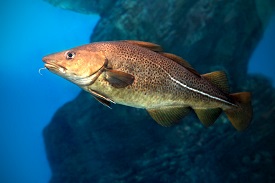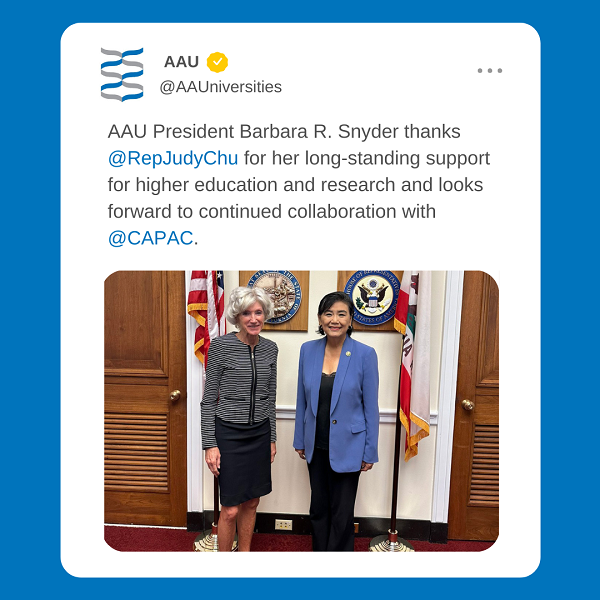 Education Department Hosts Summit on Equal Opportunity in Higher Education
Education Department Hosts Summit on Equal Opportunity in Higher Education
Last week, the Department of Education hosted a National Summit on Equal Opportunity in Higher Education to discuss how colleges and universities across the country can continue to fulfill the promise of equal opportunity for all students in the wake of the Supreme Court’s decision to limit the use of race-conscious admissions. More than 100 Biden administration officials and national education leaders, including AAU President Barbara R. Snyder; Brown University President Christina Paxson; University of California, Davis Chancellor Gary May; University of Illinois Urbana-Champaign Chancellor Robert Jones; and University of California System President Michael Drake attended the summit.
Participants discussed a range of strategies that colleges and universities can use to create diverse student bodies, including targeted recruitment, improving financial aid, increasing collaboration with K-12 schools, and making it easier for students to transfer from community colleges to four-year institutions.
In a morning session, UC Davis Chancellor May and University of California System President Drake talked about innovative admissions practices that have allowed institutions in California to continue achieving diversity in their student bodies despite a state law which, since 1996, has prohibited public universities in California from considering race or gender in admissions. Chancellor May emphasized that diversity is not just something that is “nice to have” – instead, it is an imperative that provides better outcomes in society and in business for everyone. Brown President Paxson also spoke about what her university is doing to recruit diverse students and to level the playing field for students once they get to Brown. She discussed the importance of reducing students’ financial burdens, not only through institutional aid, but also by increasing public funding for education and for programs such as Pell Grants.
 House China Committee Members Call for Increased R&D Investments and Immigration Reform to Enhance U.S. Global Competitiveness
House China Committee Members Call for Increased R&D Investments and Immigration Reform to Enhance U.S. Global Competitiveness
Last Wednesday, the House Select Committee on the Chinese Communist Party held a hearing on Ensuring U.S. Leadership in the Critical and Emerging Technologies of the 21st Century. The hearing focused on how the United States can continue to maintain a technological edge over China through both public and private investments in research as well as other policy changes.
Witnesses at the hearing emphasized the need for the United States to invest in science that can help develop the “foundational base” for critical technologies that private investors can eventually commercialize. Members of Congress also talked about how attracting and retaining international talent is imperative for maintaining both national security and U.S. global competitiveness, and how the U.S. immigration system continues to impede international students and scholars from living and working in the country after completing their studies here. Rep. Seth Moulton (D-MA) urged the committee to “find the political courage to come forward with truly bipartisan recommendations to our colleagues to fix this self-inflicted wound.”
The committee also discussed science funding for FY24 and the investments for science and innovation called for in the CHIPS and Science Act passed last year. Rep. Ro Khanna (D-CA) expressed hope that the committee could, in a bipartisan fashion, recommend Congress increase funding for critical science agencies such as the National Institutes of Health and the National Science Foundation.
![]() New Report Projects Significant Workforce Shortages in the Semiconductor Industry
New Report Projects Significant Workforce Shortages in the Semiconductor Industry
A new report from the Semiconductor Industry Association projects that, even as the U.S. semiconductor industry expands thanks to investments contained in the CHIPS and Science Act of 2022, as many as 58% of the new jobs created in the industry by 2030 will go “unfilled at current degree completion rates.” The report estimates that “of the unfilled jobs, 39% will be technicians, most of whom will have certificates or two-year degrees; 35% will be engineers with four-year degrees or computer scientists; and 26% will be engineers at the master’s or PhD level.”
The report makes several policy recommendations to address the projected workforce shortages, including expanding certification and training programs at community and technical colleges to help grow the technician pipeline; expanding the pool of domestic STEM students and encouraging more STEM students to pursue careers in the semiconductor industry; and retaining and attracting international STEM talent and advanced degree holders. The full report is available here.
 Featured Resource: AAU Urges Appropriators to Prioritize Investments in Higher Education, Research, and Student Aid in FY24
Featured Resource: AAU Urges Appropriators to Prioritize Investments in Higher Education, Research, and Student Aid in FY24
Senate Appropriators Pass All 12 Funding Bills
Last week, for the first time in five years, the Senate Appropriations committee passed all 12 of their funding bills. The final appropriations measures passed by the committee were: Defense, Homeland Security, Interior-Environment, and Labor-Health and Human Services-Education.
With some notable exceptions, such as for the National Science Foundation and NASA, the Senate allocated higher levels of funding for key education programs and research agencies compared to the House appropriations bills. Specifically, AAU is encouraged by the Senate committee’s proposed $250 increase to the annual maximum Pell Grant award.
 Ad Hoc Group for Medical Research Asks Lawmakers to Reject Cuts to the National Institutes of Health
Ad Hoc Group for Medical Research Asks Lawmakers to Reject Cuts to the National Institutes of Health
The Ad Hoc Group for Medical Research, a coalition of health groups, scientific and medical societies, and academic and research organizations (including AAU), released a statement earlier this month expressing grave concerns about the significant cuts in the FY24 appropriations bill released by the House Labor-HHS-Education Subcommittee, which will have a massive negative impact on “patients, families, and communities that rely on medical research supported by the National Institutes of Health.” The bill provides a total of $45.1 billion in funding for the agency, a $3.8 billion cut (7.8%) to the NIH base from FY23 enacted levels.
The statement noted that “underfunding the world’s premier medical research agency will bring detrimental consequences to the health of all Americans now and in the future” as well as “hamper economic growth in communities nationwide where NIH-supported research occurs.” The group called on lawmakers to “continue their bipartisan commitment to medical research and ensure at least $51 billion for the NIH’s base program level.”
LRUR Going on Hiatus Through Labor Day
In accordance with AAU’s summer hours, the Leading Research Universities Report will be taking a break during the month of August. Publication will resume after Labor Day.
News of Interest
AP: Scholarships Have Helped Displaced Afghan Students Find Homes on University Campuses Across the U.S. – Hundreds of Afghan students displaced by the rise of the Taliban in 2021 are studying at U.S. universities, including Arizona State University and Rutgers University, on scholarships. Many are now nearing graduation and preparing for the next steps in their lives.
Inside Higher Ed: Students Relying on More Financial Aid But Fewer Take Out Loans – New data from the National Center for Education Statistics found that, while 72% of undergraduates enrolled during the 2019-20 academic year received some type of financial aid, only 36% took out student loans. On average, students received $14,100 in aid and $9,300 in grants and took out $7,900 in loans.
The Columbian: Sen. Murray Announces UW Semiconductor Research Grant – Last week, Sen. Patty Murray (D-WA) announced “a $10 million grant for semiconductor workforce development and training at the University of Washington.” The National Science Foundation grant funded by the CHIPS and Science Act will go to the U.S.-Japan University Partnership for Workforce Advancement and Research & Development in Semiconductors (UPWARDS) for the Future project – a collaboration between five Japanese universities and six American universities (including the University of Washington and Purdue University).
Inside Higher Ed: Visa Denials Disproportionately Affect African Students – A new report from the Presidents’ Alliance on Higher Education and Immigration and Shorelight Education shows that “African students faced a visa rejection rate of over 50 percent in 2022, up nearly 10 percent from 2015,” and “more than five times higher than the rate for European students.” Per the report, visa denials have gone up across the board and signal “a potential challenge to U.S. institutions seeking to diversify their international recruiting efforts.”
Higher Ed Dive: Persistence Rate in Fall 2022 Returned to Pre-Pandemic Normal – A new report from the National Student Clearinghouse Research Center found that, “of first-year students who enrolled in fall 2021, 75.7% returned to college by the following year.” The rate is similar to what was “seen among the 2016, 2017 and 2018 freshman classes.”
Featured Research

Bioengineered Yeast Feed on Agricultural Waste
Researchers at the Tufts University School of Engineering have created bioengineered yeast that can feed on sugars occurring in agricultural waste products, such as “leaves, husks, stems, even wood chips,” instead of sugars in food products consumed by humans. Scientists hope that yeast that can feed on biowaste can eventually be used to improve production of “biosynthesized” drugs, “such as insulin, human growth hormone, and antibodies,” biofuel, or bioplastics.

Overfishing Linked to Rapid Evolution of Codfish
New genetic analysis from Rutgers University shows that “Atlantic cod evolved new traits over only decades during a period of overfishing – evolutionary changes that scientists formerly believed could take millions of years.” The research found that overfished cod developed “survival advantages” that made them less likely to get caught and “more likely to reproduce before being caught.”
From Our Feeds

AAU President Barbara R. Snyder routinely meets with members of Congress to advocate for a strong government-university partnership. She recently met with Rep. Judy Chu (D-CA), chair of the Congressional Asian Pacific American Caucus, and thanked her for her long-standing support for higher education and research.
 ICYMI:
ICYMI: